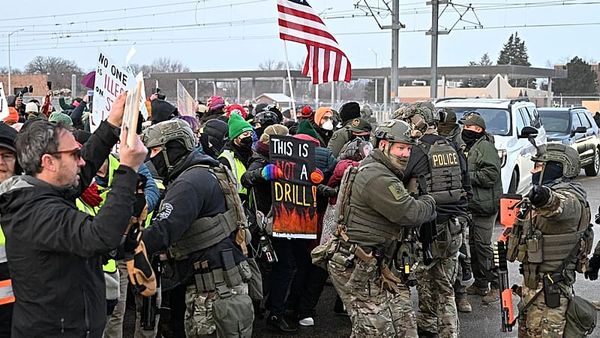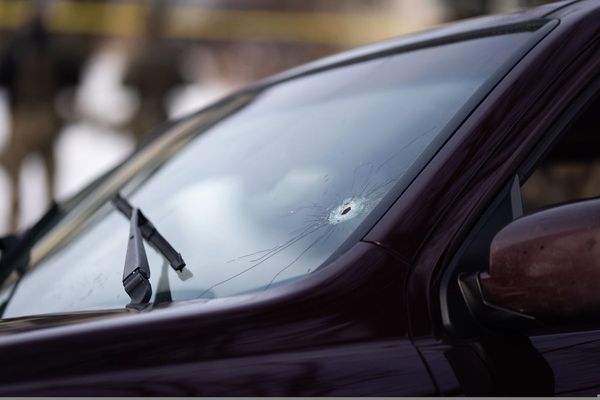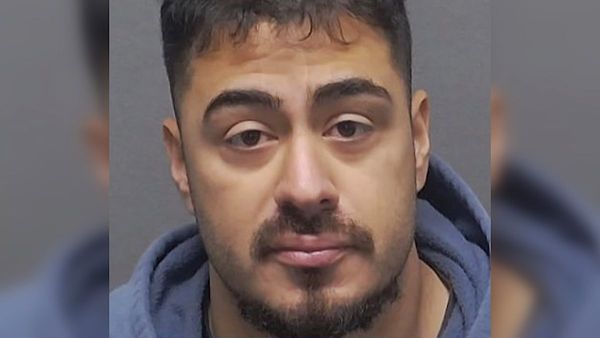
The eccentrically named Bunch of Carrots pub in the heart of Herefordshire oozes English rural charm, with its hanging flower baskets, picnic benches and carvery fare.
Located three miles south-east of Hereford in the picturesque village of Hampton Bishop on the edge of the River Wye, the inn is emblematic of its countryside setting – friendly, peaceful, far from the noise of distant towns and cities.
A short stroll from the pub, past large red-brick houses patriotically displaying St George’s flags, lives a family that has experienced more than a lifetime’s share of noise and conflict – nine Syrian refugees brought here under the government’s flagship resettlement scheme.
Sitting in the lounge of their bungalow, looking out over a green garden peppered with children’s toys, the family reflect on how life in the village of around 500 residents compares to their time in the war-torn Syrian city of Homs.
“Being in the UK brought us back to being in the same life we lived before the war,” says Samer Awad.
Samer, 42, travelled to the UK via Lebanon with his wife, Hieam Abdul Rahman, 32, and their four children, Mahmoud, 17, Firaz, 15, Soltan, 10, and Amir, seven, as well as his mother, Samar Al Hafim, 60, and brother Mohamad Aouad, 22. Mohamad’s wife, whom he met after arriving in the UK, now lives with them in Hampton Bishop.
The family are among 60 Syrian refugees welcomed to Herefordshire in 2016 and 2017 under the vulnerable persons resettlement scheme (VPRS), through which the UK government pledged to take in 20,000 displaced Syrians by 2020. David Cameron unveiled the target on 7 September 2015.
Progress towards meeting the target has been broadly praised by refugee support organisations, but with the conflict in Syria showing no sign of abating the focus has now shifted to securing a further pledge from the Home Office.
Samer and his family are great advocates for the scheme, not just for the opportunities resettlement has brought them but also for what Syrians can offer the UK. “I would say to the government to allow more refugees to come with ease. They should not worry. In the future they will see the positive change refugees can bring. Syrians are not lazy people. They like to work.”
Further along the River Wye, in Hereford, another of the resettled families are keen to show that assisting Syrian refugees benefits the wider community. Sitting in his new home, a three-bedroom flat in the heart of the small cathedral city, Emad Nor Eldeen, 54, says: “We’re glad they are going to receive 20,000 refugees and we hope that they achieve that number. But they should bring more.”
Emad, who arrived in 2017 with his wife, Rana Al Taweel, 46, their son Alad, 22, and daughter Walaa, 24, ran a tourism agency in Homs before the war broke out. After weeks of escalating conflict, his breaking point came when he was shot in the leg as he walked home from work. He and the family fled to Damascus and then Egypt, before being resettled in Herefordshire.
The family have a mischievous sense of humour and frequently break out into laughter. Asked where they would be if it were not for the resettlement scheme, Emad chuckles as he replies. “We would still be stuck in Egypt and Alad would have ended up being a tuk-tuk driver. I would have died on the doorsteps of the hospital waiting for treatment.”

In Hampton Bishop, Samer says he was lucky not to have been shot but had a close call. He managed a carpentry workshop in Homs before the conflict, and his children were in school. “We were very happy, our situation was very good,” he says. In November 2012, Samer was driving home after work and two sniper bullets blasted through the roof and window of his car. “After this incident, we left for the village. That was it. We never went back to Homs. We left with the clothes on our backs. We took nothing with us.”
The family fled to their farmhouse outside the city, in an area unaffected by the conflict, hoping it would pass. They were unable to work or go to school. But the conflict caught up with them. They were forced to move again, this time to an area outside Homs called al-Waer.
In al-Waer they were taking shelter when a mortar shell struck the building they were in, killing Samer’s father, Mahmoud Awad. He was 62. It was at this stage that they decided to leave Syria and flee to relatives in Lebanon. To escape the area they had to pay Syrian forces to let them pass. “There was no humanity,” Samer says. “People just wanted money. The money was more important than human lives.”
In Lebanon, life was in some ways worse. The young children were forced to work but were never sure if they would be paid. They couldn’t go to school. And Samer says the Lebanese people were not welcoming. The family endured a miserable life for two years before the UN refugee agency informed them in late 2016 that they were to be resettled in the UK.
“Our first reaction was we were very happy we’re leaving Lebanon,” Samer says. “But at the same time we were going into the unknown.”
The family landed at Birmingham airport on 25 January 2017 and were welcomed by a support team from the charity Refugee Action, who were commissioned by Herefordshire council to help the new arrivals during their first year in the UK.
The family threw themselves into their new life, signing up to English classes, enrolling the children in local schools and, in Mohamad’s case, heading out to work at a KFC restaurant.
Mahmoud is a particular source of pride for his family. The tenacious 17-year-old could not speak a word of English when he arrived 18 months ago and now waxes lyrical about his ambitions to study automotive engineering at university. He invariably acts as an interpreter for his parents and grandmother.
Proudly displaying his awards and certificates for achievements at college, he says: “I would like to be a car designer. I have made a lot of friends at school, who have helped me learn English, as have the teachers.”
Samer hopes to work in the UK but for now is receiving treatment for complications arising from childhood polio. He says any early anxieties about how they would fit in and be received were soon forgotten. The people of Herefordshire have embraced them with open arms.
English families have welcomed Samer and the others into their homes for roast dinners and fish and chips, and visited for traditional Syrian meals. Mohamad’s wedding reception was held at their home and in the Hampton Bishop village hall. The guests were a mix of new Syrian and English friends.
“We didn’t feel like strangers because people treated us so well,” Samer says. “The kids are starting to build a future. This is the most important thing for us.”

In Hereford, Emad describes a similar sense of elation. “The feeling was like going from the darkness to the light. We felt like we were born in this little town. People here respect our culture; we in return respect their culture too and their respect for us.”
Emad and Rana have been introduced to English food. “We have English friends who we have invited over,” Rana says. “But the English food is making me very fat,” Emad adds, patting his stomach, again prompting laughter throughout the room.
Alad, like Mahmoud in Hampton Bishop, is ambitious. After throwing himself into work at a rubber factory, he has decided to focus on English studies so he can broaden his opportunities. “I want to improve my English but I would like to study other subjects,” he says.
Louise Calvey, the head of resettlement at Refugee Action, hopes the government can build on the success seen in Herefordshire, which has defied any preconceptions of what a suitable destination for refugees might look like.
“There’s a perceived wisdom about refugee settlement – that you need high levels of diversity in an area, you need good access to relevant cultural support, faith-based communities, access to mosques, halal food, good interpreting services, which are all great for resettlement,” she says. “Herefordshire doesn’t tick all those boxes. It’s very rural. There’s not lots of cultural diversity.
“But because of that groundswell of support and outrage about what’s happening in Syria, it’s really pushed the envelope in terms of where you can do resettlement successfully. We’ve seen that in Herefordshire, in Shropshire, very ‘chocolate box’ rural villages and towns that have seen refugees resettled to great success.”
She adds: “We need to know what the future is going to look like now. Local authorities need to plan for their arrivals beyond 2020 now, they think two, three, four years in advance.”
In Hampton Bishop, the children are playing in the sunshine in the back garden. Hieam is serving up thick Arabic coffee and baklava. Samer is asked how life might have unfolded for him and his family had he not been offered a chance to start again in the UK.
“The difficult life we would be living in Lebanon is worse than death,” he says. “It’s like a living hell. When you see the future of your life and your kids being destroyed slowly, that’s harder than being hit by a bomb. Coming here was like being drowned and rescued.”







